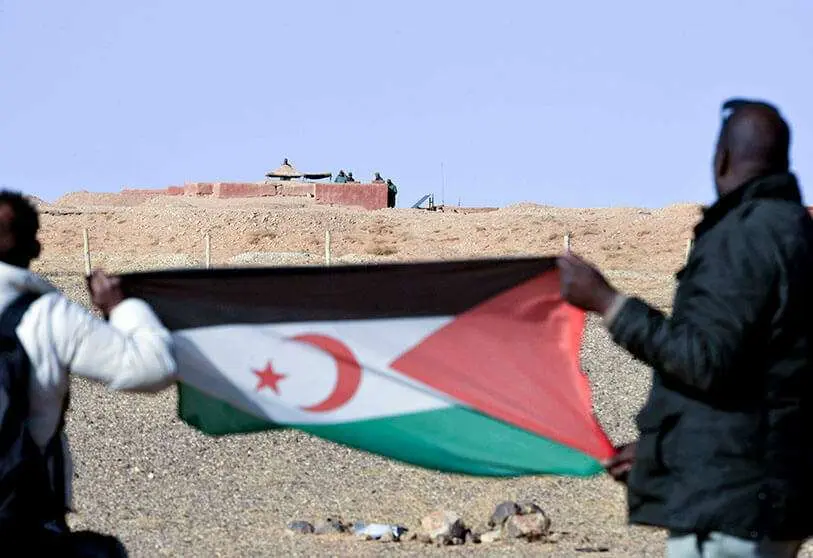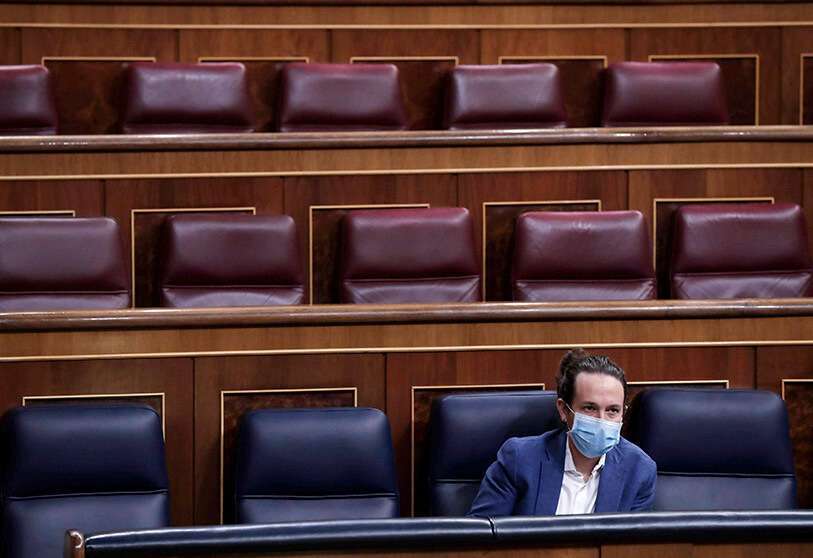Podemos party and the question of the Moroccan Western Sahara

Last November 30, in the TV programme 'Al Rojo Vivo', on La Sexta, a journalist shocked many Moroccans and, in general, all those who know about the former Spanish Sahara. The journalist asked the second vice-president, Pablo Iglesias, a question based on erroneous statements and falsehoods. He asked "whether the government was going to comply with international law and the European Union's agreements on Western Sahara" to hold the referendum on self-determination in the former Spanish colony, occupied by Morocco 45 years ago".
The alleged international legality, if any, should be complied with by the UN, urging all nations to comply with it and not to burden Spain alone with the 'Sanbenito'. Furthermore, the referendum on self-determination referred to in the question is inapplicable and was abandoned by the UN 20 years ago. Finally, under international law, it is incorrect to use the term occupation in the case of the Sahara, particularly as there was a transfer of powers from Spain following the Madrid agreements, concluded in accordance with the UN Charter, deposited with the UN Secretariat and the General Assembly itself took note of this on 14 December 1975.
This is an incorrect question which misleads media users. These users have the right to receive correct and truthful information, to be protected from misinformation and manipulation. This will lead to a well-informed and educated society, in possession of an adequate general opinion, free from falsehoods, and thus able to rise to the challenges and to the same level of international opinion in general.
The unfortunate question was related to Pablo Iglesias' taking a stand on his Twitter account in favour of the totalitarian armed movement "Polisario Front". He had referred to the tension in the area of Guerguerat, on the border with Mauritania, after the "Polisario" declared the ceasefire to be broken. On his Twitter account he recalled that the UN "...Reiterates its commitment to hold, without further delay, a free, fair and impartial referendum for the self-determination of the people of Western Sahara... United Nations Security Council (13 January 1995)
By using this resolution out of the historical context of the dispute over the Sahara, Iglesias is encouraging disinformation that unfairly and wrongly places Morocco as the bad guy and the violator of international law, while the "polisario", a movement with a terrorist background against Spanish citizens and their property, is presented as both the good guy and the victim. The aforementioned resolution is not only taken out of context but is also completely outdated and obsolete. Pablo Iglesias, as vice-president of the government and leader of a political formation, needs to know this and should not make unfounded statements.
It has been 20 years since 2000 that no Security Council resolution has referred to any referendum. The Settlement Plan submitted by Javier de Cuéllar, which envisaged the referendum as a form of self-determination, considered it inapplicable after ten years of failed attempts. The Plan with its referendum was replaced by the "framework agreement" presented by James Baker in 2001. A draft agreement that discards the two maximalist options: total independence or integration by opting for autonomy as the third option. As a counter-proposal, the then president of Algeria, Abdelaziz Bouteflika, presented the division of the Sahara in the name of Algeria and Polisario. This was rejected by Morocco. Six months later. James Baker presented another plan without success. To break the deadlock, Morocco offered a proposal based on broad autonomy. An initiative that was consulted and agreed on by the Sahrawi population through its parliamentarians, town councillors and prominent members of Sahrawi civil society. This initiative was presented to the UN Secretary General on 11 April 2007 and has been unanimously welcomed by all members of the Security Council. From that date until today, all the Council's resolutions refer to this initiative, which states: "the serious and credible efforts “of Morocco, to move the process forward towards resolution.
Had Vice President Pablo Iglesias consulted his Foreign Ministry before hanging up the obsolete Resolution 973 of 13 January 1995, he would have been warned of the error and misuse he was about to make.
The latest Security Council resolutions are normally quoted precisely to prevent references from becoming outdated. It is therefore surprising that instead of quoting the most recent and up-to-date ones Pablo Iglesias quotes the one that dates back 25 years. During the last decades all the Security Council resolutions do not quote the referendum. They all express "the need to achieve a realistic, viable and lasting political solution to the question of Western Sahara based on compromise".
On the other hand, Pablo Iglesias, when making his clarification in La Sexta pretending that he was not taking a position because when someone quotes a legal text "he is not taking a political position, he is remembering a rule of obligation". It happens that this is a reminder that is unfounded and out of place. Furthermore, it is surprising that a political leader builds on a false reminder of "a mandatory rule" concerning the Sahara.

Regardless of the erroneous reminder, Iglesias seems to be confusing Chapter VI with Chapter VII of the UN Charter. The question of the former Spanish Sahara is dealt with by the Security Council under Chapter VI, which refers to the peaceful settlement of disputes where there is no such allegedly binding rule.
Therefore, it is difficult for Morocco to believe Pablo Iglesias when he claims that his quote on Twitter is not a position "on this matter because it is my duty to be prudent and to respect the competences of each one, but I have allowed myself to remember what the UN Security Council said". In Morocco, people think that Pablo Iglesias has mistakenly positioned himself in an unfortunate way, clearly aligning himself with the military regime of Algeria and the totalitarian movement of the "Polisario". An alignment at the expense of Spain's interests with Morocco and pitting the governments of both countries against each other. In the eyes of Moroccan public opinion, this is not a fortuitous and trivial attempt but a premeditated one preceded, at the beginning of this year, by another one of the same kind.
Paradoxically, there was an attempt by the Spanish government itself, chaired by the Socialist Pedro Sánchez, to force Foreign Minister Arancha González Laya to prevent the damage and put out the fire caused by the second man on board of the Spanish government and his Podemos party.
In Morocco they still remember February of that same year, when excellent relations of friendship, neighbourhood and cooperation between Spain and Morocco, which were maintained by the Treaty (signed on 4 July 1991), were undermined and the interests of the 80 million citizens of both countries were violated. It was then that Podemos number two Nacho Álvarez, Secretary of State for Social Affairs, received the SADR's representative for Social Affairs Suilma Hay Emhamed Salem, an organization which Spain, like most countries in the world, does not recognise as such, except Podemos. He also posted it on his Twitter account and that of the Secretary of State. When the storm erupted, however, he had to delete both of them as well as the photos attached. Not only did it provoke rejection by the government in Morocco but also general unease, and the press conveyed this in its headlines and articles. A Moroccan newspaper indignantly pointed out that Morocco "has never interfered in the internal affairs of Spain, a country that is facing the independence wavering parties of Catalonia".
Morocco is convinced that it is a question of adopting a position, despite the fact that Pablo Iglesias says otherwise. A positioning and alignment that does not obey to supposed and fallacious rights but to ideological reasons. There are still communiqués and declarations from the Spanish communists expressing their solidarity and making Morocco's demands their own. Among these, we can cite the declaration of April 1961 in which the PCE stated: "In the case of the rocks, of Ifni, Sequiet el Hamra and Río de Oro, the legitimacy of the Moroccan claims offers even less discussion". Moroccans, including the Saharawis, cannot understand this radical change; the only explanation is that Franco was in Spain at the time who no longer exists, and in the Maghreb at that time the Algerian people's struggle for independence had not yet ended and Colonel Boumedian had not yet made an assault on power by establishing his totalitarian regime based on populism and demagogy under the guise of progressivism, under which expansionism across the Sahara was concealed in order to reach the Atlantic with eyes on the Canary Islands. He created the Polisario for the Sahara and the IMPAYAC for the Canary Islands. Since then, the communist movement abandoned support for Morocco and aligned itself with the failed regime of the military in Algiers.
In Morocco, the Sahrawis in particular, cannot understand either how it can be forgotten that, in these territories, the same Spanish authorities from Tetouan, where the Sahara depended, urged that Friday prayers in these territories be said in the name of the Jalifa of the Sultan of Morocco.



